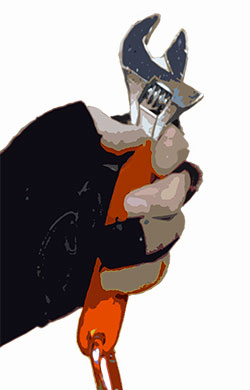Technician Crew Guide
Conduct
A s a member of the crew you are expected to conduct yourself in a gracious and professional
manner while working in the CPAC. Others working in the space will depend on you for
answers or at the very least to guide them to the person who can be of the utmost
help. Our clients depend on service that is both technically and emotionally helpful—As
technicians we supply that technical and emotional support. As technicians we should
be courteous, knowledgeable, and dependable.
s a member of the crew you are expected to conduct yourself in a gracious and professional
manner while working in the CPAC. Others working in the space will depend on you for
answers or at the very least to guide them to the person who can be of the utmost
help. Our clients depend on service that is both technically and emotionally helpful—As
technicians we supply that technical and emotional support. As technicians we should
be courteous, knowledgeable, and dependable.
1. Be on Time: Report to work at the agreed-upon time, ready to work. Check in with the person in charge of your crew when you arrive. Call times are ESTIMATED, and may be modified as details become refined. Be flexible and allow time for parking; crew members are not permitted to park in the scene yard just because they're late.
2. Plan Ahead: Bring food, medication, a change of clothing, and your technical gak (flashlights, pencil and paper for notes, multi-tool, etc). Cuesta College is quite a few miles from San Luis and Morro Bay--you will not always have enough time to leave the facility, drive into town, eat, and come back. A refrigerator and a microwave are available for your use.
3. Do Not Conduct Personal Business while at work. The use of personal communication devices should be kept to a minimum and used only for emergencies. If you are expecting an important call, notify your direct supervisor that you may be detained at some moment during the work call. Conversations (text or otherwise) should happen during breaks.
4. Work with a Cooperative and Positive Attitude. Every person is an important component to the success of an event. Be willing to work with anyone on any task no matter how mundane or menial it may seem—every task is necessary!
5. Be Aware: While you are working here, you will be in direct or indirect contact with complex and potentially dangerous equipment. Your life and the lives of those around you depend on your diligence to safety and an awareness of the activities that are happening around you. It is easy to become self absorbed in a given task and this is usually a recipe for disaster.
6. Be Safe: Read the Cultural and Performing Arts Safety Manual thoroughly so that you are aware of the safety procedures used in the facility. Everyone must read sections I, II, and II. If you are working in the scene shop, you will also need to read section IV. Your ignorance of these policies will severely affect future employment and depending on the severity of the infraction may have you removed from your current crew assignment.
If an accident or injury occurs, or you see a safety hazard, be sure to report it immediately to your supervisor. Equipment in the theater can be extremely dangerous. If you are unclear on any aspect of the safe operation of any equipment please ask for instruction.
Memorize the location of all eleven fire extinguishers, pull stations and first aid kits. Your supervisor may test you on this at any given moment.
7. “The Uniform”: It is recommended you have two different sets of clothing, one set for pre and post show activities and a special set of blacks for the actual running of a program.
Work Clothes
- Closed toed flat bottomed shoes, non slip sole (i.e. tennis shoes, work boots etc.)
- Long pants made of durable material
- Shirt that covers your shoulders.
- No jewelry.
- No loose excessive fabric (i.e pirate sleeves or flare bottomed jeans etc.)
Run Crew Clothes:
- Closed toed flat bottomed shoes, non slip sole –ALL BLACK
- BLACK socks
- Long pants made of durable material – ALL BLACK (no large text or graphics)
- Shirt that covers your shoulders.- ALL BLACK (no large text or graphics)
- No jewelry.
- No loose excessive fabric (i.e pirate sleeves or flare bottomed jeans etc.)
8. At the End of the Day: Return all borrowed materials (i. e. radios, tools, gloves). Check with supervisor before leaving the facility.
Work Rules:
1. All stagehands require a 1/2-to-1 hour meal break after 5 continuous hours of work. Client’s & Artist's employees shall observe all meal breaks at the same time as CPAC stagehands. “Dry” rehearsals or work not requiring operation of technical equipment may continue.
2. In an emergency, the client and CPAC Technical Coordinator/Director may mutually agree to waive the meal break.
3. A 15-minute break is required approximately every 2 hours.